May 1, 2019
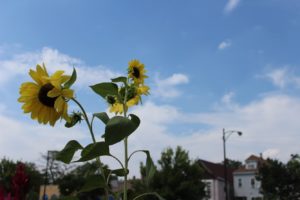
by Steven Dougherty, Precious Blood Volunteer
Steven Dougherty is a Precious Blood Volunteer serving at Precious Blood Ministry of Reconciliation (PBMR) in Chicago, Illinois. In the three reflections below, Steven paints pictures of hope he has encountered while working there.
My second week in Chicago was one of the most violent in recent history. Waiting for the bus, I saw a man and a woman talking. They spoke slowly. The air was thick and hot. As she was leaving, the woman leaned in and hugged the man. Then she held him for a moment at arm’s length. She looked him in the eyes, and with worry in her throat she said, “Be safe.” Her words, thick in the hot air. They were desperate wounded words, heavy with fear. This was a command, a salutation, a wish—something impossible, or at least it seemed so at the time. So many people had died. Then she let the man go, freeing him from her temporary protection, hoping her wish would be enough. I thought it was beautiful how much she cared for this man, how well they must have known each other. Then the woman came to me and did the same!
****
In my months of volunteering at PBMR I have witnessed struggle, I have witnessed pain, and I have witnessed loss. I have been asked many times about hope. How can I stay hopeful doing the work I do at PBMR? I struggle with this, because finding hope feels like a privilege. If I say that I have hope that this community I work in will be revitalized and not gentrified, if I say that I hope the people we help can get jobs and will be treated fairly, or if I say that I hope people will stop dying so young, I am doing so only for myself. I think these things because at the end of the day I am tired. I have done what I know I can do, and the rest seems impossible, so I hope. I am not saying this is a bad thing, only that is not the thing I want it to be. Access to hope has become a privilege. It has become a way of distancing ourselves from the responsibility of the world’s problems. Hope for things to get better keeps things the way they are.
But there is another side to all of this, because hope does not have to be something that is stagnant. Hope can move through us and into others. When this happens, when hope draws us together, there is power—power for real change in the world. When people work together with a united vision of hope, when they know exactly what they want to accomplish, hope can be actualized. We can reach out with hope and work together to make sure that everything will be okay, and although it is hard, we do this work anyway.
In my months of volunteering at PBMR I have also witnessed this: a new kind of hope—a hope that does things in the world. It is a hope that people share with strangers. It is mixed with fear and pain, but it is strong enough to overcome them both. Since it was given to me by the woman at the bus stop, I have seen it all over Chicago, I have even used it myself: “Be safe.” There is so much behind these words. They carry a message that you are cared for, and they carry a promise that although there is so much danger that I cannot solve, you have my protection. Anytime someone leaves the Center you hear all of this. Everyone is not always safe. In fact, our participants are rarely safe—but will still hope. We believe the impossible and together we make it a little more possible.
****
The man in front of you seems old but you know that time does not pass here as it does elsewhere, so in the letter to your friend you will call him worn. He is asleep. He has been asleep since you got on the bus, and since you got on the bus, the bus has filled with heat and pressure.
In the letter to your friend you will compare it to the sun—the bus—and now it grows loud. A child begins to scream. The heat and the pressure move through your spine and you feel beyond heavy—you feel worn.
You cannot make out the words of the child. In the letter to your friend the back of the bus will be another world, one that is burning in its closeness to the sun. All you hear is longing. Longing that makes you think to write a letter to your friend. Longing to be heard: the painful pulling apart of a body from its limbs. In the letter, you will call it gun violence in Chicago. The man in front of you who you will call worn, but who you know is old for this bus and the violence, whispers with his eyes still closed, “Hey now, it’s gonna be okay.” You are not sure who he means to say it to, the child or himself. In the letter to your friend he will say it to everyone because “it” is a delicate thing: the bus and the child and your spine and Chicago, but you believe him anyway.
Steven is a current Precious Blood Volunteer serving at Precious Blood Ministry of Reconciliation in Chicago.
To learn more about becoming a Precious Blood Volunteer go to www.preciousbloodvolunteers.org
This article originally appeared in the May 2019 edition of the New Wine Press.
May 1, 2018
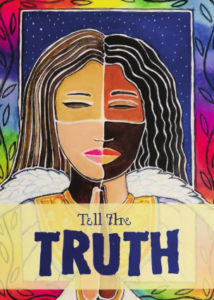 by Leah Landry, Precious Blood Volunteer
by Leah Landry, Precious Blood Volunteer
Most white people do not want to talk about race. In fact, I feel uncomfortable typing this article right now. I am so scared of saying something wrong or implying something hurtful so it would be easier to stay silent. But after Chicago Regional Organizing for Anti-Racism’s training (C-ROAR), I realize it does not matter what I want or what is easy: we have to talk about race.
I knew early on that racism existed. When I was eight years old, my brother’s best friend joined our family. Shaun is African American and I saw that he was treated differently than my Caucasian brothers in our predominately white neighborhood. I remember Shaun and me getting weird looks when we were together and the police pulling him over much more often than my white brothers. But our conversations at home were about how other people were discriminatory, never about how racism worked through us as white people. I knew I had white privilege, but I did not realize I was part of the problem.
As a year-long volunteer at Precious Blood Ministry of Reconciliation (PBMR), all my suspicions that racism ran deeper than I could articulate intensified. I see every day how people are discriminated against because of the color of their skin. In the Juvenile Temporary Detention Center, I was overwhelmed and appalled by the disproportionate number of black and brown teens my city locks up. While working at PBMR, I accompanied a young woman to court and was immediately told I could use the shorter line because the guard mistook me—the only white woman in the crowd—as a lawyer. I met young men who were given tickets for jaywalking and biking on the sidewalk while I had escaped every instance of a police stop with nothing more than a warning. I witnessed intense poverty: people struggling to pay rent, afford clothes, or feed a family, always one crisis away from losing everything. I saw all this and knew that there must be root causes, but I did not understand the depth to which racism and white supremacy created and perpetuated these circumstances.
Through the anti-racism training and researching on my own, I learned that racism is at the heart of every one of these issues. I discovered that nationwide policies of redlining forced black families into segregated neighborhoods and denied them access to the same government-backed loans that allowed my own grandparents to buy a home (“A Case for Reparations”, Ta-Nehesi Coates). I found out how the criminal justice system is designed to target, imprison, and harass people of color (The New Jim Crow, Michelle Alexander). I learned how the inequities originated: not because of something inherent or lacking in communities of color, but because of structures that intentionally privilege white people and subjugate people of color.
The hardest lesson I learned is that racism is not just the overt, stereotypical racism we immediately think of, like the KKK or the rally in Charlottesville. It is the deep-rooted racism of unconscious bias that lies within all of us, because we were all raised in a racist society. This was and still is hard to fully comprehend for me. I, in my ignorant whiteness, perpetuate racism, even though I have a black brother who I love dearly, even though I say I am committed to racial equity and justice, even though my family told me to love everyone regardless of race. I have centuries of ingrained white supremacy born into me. I was raised in a society that was built on the backs of enslaved people of color and live in a country that continues to privilege white people.
The anti-racism weekend was transformational for me. It highlighted how entrenched white supremacy is and now I cannot un-see it. The most challenging part is that now I see racism play out in me. I catch myself stereotyping, preferring white people and white practices, making myself the center in spaces of color, and poking holes in stories of discrimination and racism. One particularly poignant moment of recognizing my own racism was when a person of color in the anti-racism training called me out for my racist behavior during the training itself. It is painful and embarrassing to admit it, but I know it is the truth. I hope that acknowledging my faults can clear the way for other white people to start noticing their own. Nothing is going to change until white people recognize that we are part of the problem, that we are perpetuating the system of white supremacy, whether consciously or unconsciously. But we cannot stop at recognizing that racism works through us, we also must begin to change.
Every time I recognize a way in which I am perpetuating white supremacy, I try to change my behavior and truly stand up for communities of color. I repeatedly question my actions in all my work at PBMR, since I am in a position of power over women of color. I am trying to rework the system so that the young women can be in charge. I am continuously investigating how I, as a white woman, can play a role without recreating unjust structures. I am educating myself on both the oppression and strengths of different communities of color, as I know that each community—and each individual for that matter—has a unique experience of discrimination. I am constantly trying to learn how to be more aware and understanding.
I know talking about race is hard. Believe me, writing this article was really hard, and scary. And we are going to falter and err sometimes. But that’s okay, because mistakes are part of the learning process. The only real mistake is if we do not try at all.
Leah is a current Precious Blood Volunteer serving at Precious Blood Ministry of Reconciliation in Chicago.
To learn more about becoming a Precious Blood Volunteer go to www.preciousbloodvolunteers.org.
Mar 1, 2018
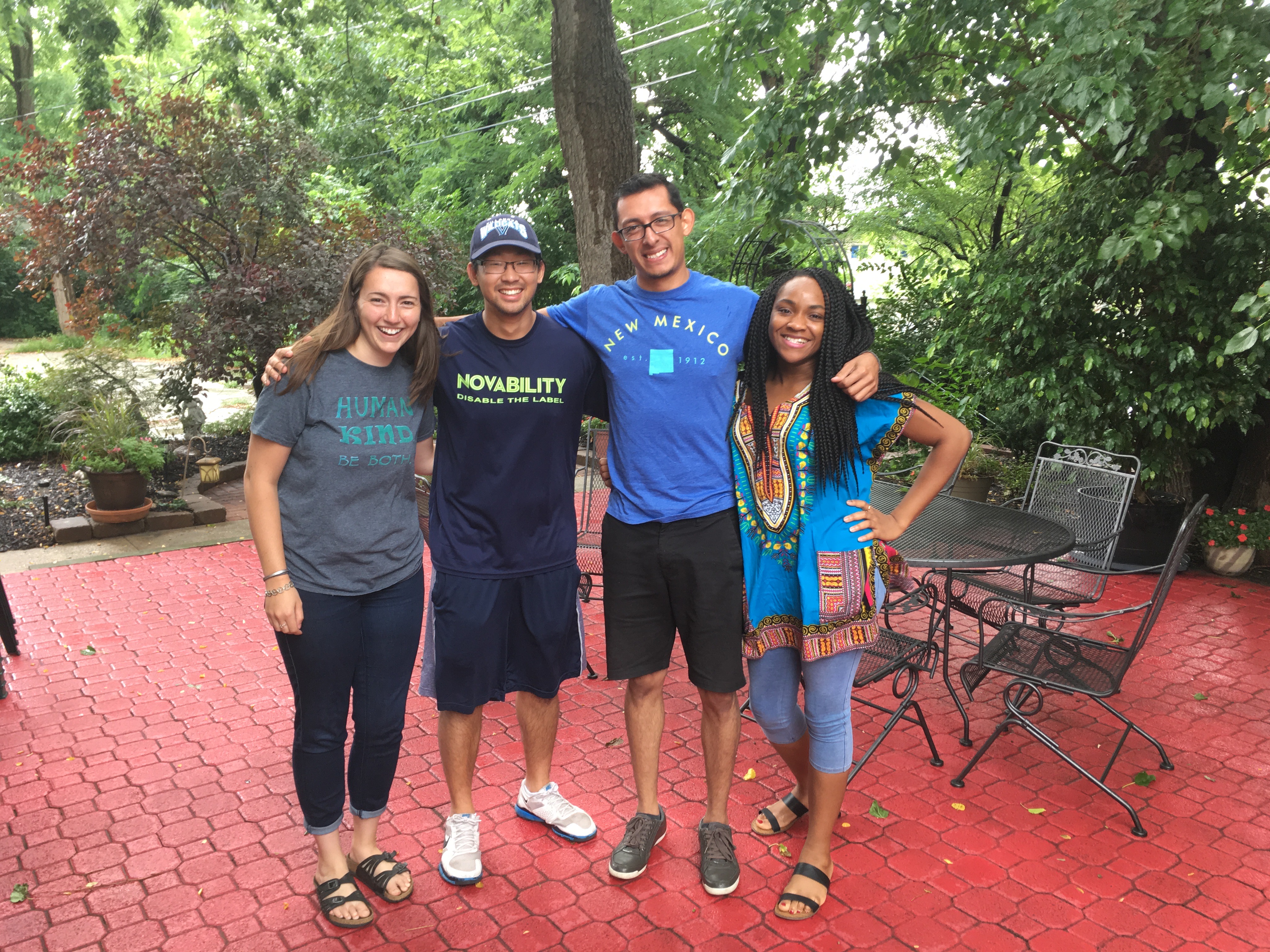
Precious Blood Volunteers’ Orientation, July 2017, Leah Landry, John Lee, Hector Avitia, and Lota Ofodile
by Lota Ofodile, Precious Blood Volunteer
There’s an old story that has been circulating in my family for years now, since I was born—the tale of how I got my name. Legend has it that my grandfather wanted to name me Raluchukwu (which means “Choose God” in my native language, Igbo) but that changed after a little conversation.
Interesting fact: I grew up being part of a small Catholic community called The Neocatechumenal Way. Each year, Andrea and his wife Francesca, a nice Italian missionary couple and the leaders of our group, would make their way down to Nigeria from Rome with a new priest and seminarian and stay for a few months. They lived right next door. (So just in case some of you, like most of my friends and colleagues at the clinic are all wondering how I am so comfortable living with Fr. Dick and Fr. Garry, it’s because I have lived with priests for years).
Andrea was in the country when I was born, and apparently, after he heard I was going to be called Raluchukwu, naturally he asked what it meant. Once he found out, he said, and I paraphrase, “You can’t choose God; he has already chosen you. You just have to remember that.” That was how Lota came about. My first name, Lotachukwu, means “Remember God”.
Funny story, right? And who knows if that’s exactly how it happened? It doesn’t matter now because I have owned it, and every time I think about that story I realize how God shows himself to us in the most unexpected ways. Sometimes, the most incredible experiences happen to us when we least expect it.
At exactly this time last year, I had just graduated college and had no idea where my life was headed. I was lost and afraid. I had no job lined up. I had applied to a few places, but nothing seemed tangible. I couldn’t apply to medical school because I owe my college some tuition and so I couldn’t get my transcripts. Being an international student, especially in Trump’s America, that was a very scary time. I had pretty much accepted that I might end up moving back to Nigeria. Then Precious Blood Volunteers happened.
Growing up in my very Catholic family, my grandfather made sure we knew that helping others, especially those less privileged than we are, was just as important as prayer and going to Mass. So naturally, after about 10 years of Jesuit secondary and college education garnished with volunteering experiences here and there, I toyed with the idea of a year of service. I had heard about the Catholic Volunteer Network from a close friend who was just completing her year of service, so I put up my profile. I wasn’t even sure which group or what location I was particularly interested in. The very next day, I got an email from Tim Deveney, the Precious Blood Volunteer Director. At first, I didn’t think too much of it, just a really good recruiter who knows his job, right? But whenever I reflect on my time here, I realize that this was just another instance of God choosing me.
When I think about my orientation week, one thing stands out: prophetic voices. I remember all of us being somewhat confused and asking Tim to clarify what “prophetic voices” meant, and it basically came down to the ways and people with which God tries to get through to us. At least that’s how I’ve chosen to interpret it. It’s the #47 bus driver who has to sit through long hours of driving the same route everyday with all kinds of interesting characters, being part of conversations she’d probably rather not have if she did not have to be there. Patience. It’s John Lee, my ex-housemate and fellow volunteer who picked out monthly challenges to make the most out of his experience and ended up starting a podcast that is currently on iTunes! (I have never met anyone so insistent and intentional about self-development) It’s one of my patients at the clinic who I’m pretty confident is/was part of a gang who came back just before leaving to say thank you for making him feel comfortable and cheering him up after he cried to me while I was taking his vitals. He was just like me! A person with feelings who cries when he gets emotional. Gratitude and oneness.
At the beginning, I was mostly concerned with what and how best I would be contributing to the people I would encounter during my service year. But this experience has turned out to be much more rewarding than I ever imagined. I have gotten to meet the most amazing set of people who are dedicated to living the best versions of themselves in the Precious Blood community. I have made tremendous strides in my personal spiritual journey. I spend most of my Sundays as part of the St. Francis Xavier Parish 10:30am Mass choir. And I will be coming out of this service year with a full-time job at the KC CARE Clinic, God willing.
I am so grateful that God has once again chosen me, to be part of this wonderful community and to have this life-changing experience. I sincerely hope and pray that all of us are more attentive to the ways in which God is continuously calling and choosing us to be better people.
(Oh, and just for the record, we stuck both with names. My birth certificate actually has Lotachukwu Raluchukwu written on it. I have two first names! LOL).
You can learn more about serving as a Precious Blood Volunteer by going to www.preciousbloodvolunteers.org
You can learn more about our placement at KC CARE Health Center by going to https://preciousbloodkc.org/kc-care-health-center/
Feb 1, 2018
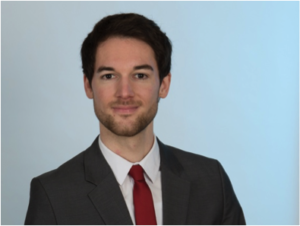
2017-2018 Volunteer Martin Echtler
by Martin Echtler, Precious Blood Volunteer 2017
Before I left my home in Munich to move to Kansas City I had a lot of different feelings and expectations regarding the Precious Blood Volunteer program and the United States in general. There were a lot of questions in my mind like “How it will be to work as a volunteer?” “Which people will I meet?” or “How will I deal with cultural borders or language limitations?” Besides these “big questions” there was another aspect, more ordinary, which was not really on my agenda in the run up to my journey – the question “How will I get around in Kansas City?” I was not worried about it, because I thought it would be like in Munich where a wide variety of different public transportation options makes it not too complicated to get from point A to point B.
My view would change after a few days in the city, when I realized that most of the people drive their own car to get around. After realizing this I thought “Well, I don’t think it’s a big deal, because I’ve heard Kansas City has a new street car and a really good bus system.” After using the street car the first time my view changed a little bit. And after a few (long) times waiting at the bus stop my view changed a little bit more. My first conclusion was “Oh boy, it would be so much easier to have a car to get around.” But during the next months my point of view would change again.
The more time I spent in Kansas City with different people at work, at home or somewhere else dealing with lots of different situations, the more I realized that indeed I don’t have a physical car, but I already sit in and drive another, special kind of “car.” At this point you might think “This weird German guy must be crazy, because he can see invisible cars.” But let me explain this within a poem I wrote. It deals with my time here as a volunteer in the Midwest of the United States and that it feels like a car ride – an inner car ride. I started at one point to “drive” and since then I’m “on the road”.
The Ride
Always forward – straight ahead or taking curves, uphill or downhill, slow or fast.
Look to the rearview mirror from time to time. Look to the exterior mirror from time to time.
Watch the lane, watch the vehicles in front and behind, watch the oncoming traffic, watch the signs, watch planned destinations.
Pay attention to passengers, watch out for other vehicles.
Don’t exceed the speed limit.
Don’t lose sight of the goals – don’t miss exits.
The fastest ways are not necessarily the most beautiful. Beautiful ways lead also to destinations.
Don’t forget to watch the gas gauge. Don’t drive too long distances in a row – take brakes and recharge batteries for the onward journey.
Pass cars sometimes – let cars pass you sometimes.
Rev the engine sometimes, crash sometimes, repair or get repaired sometimes.
Stop sometimes and ask for directions – drive away sometimes and ask for a stop.
Focus your view on the horizon sometimes – focus your view on the steering wheel sometimes.
Escape to the front sometimes – let your gaze stay on the rearview mirror sometimes.
Take curves from time to time – and avoid it from time to time.
Sometimes it’s necessary to select one lane and sometimes it’s necessary to take the other – it is necessary to ignore obvious signs that wants to lead sometimes – it is necessary to consider hidden signs sometimes.
Let the engine howl sometimes – drive quietly sometimes.
Talk to your passengers sometimes – just listen to them sometimes.
Follow their advice sometimes – ignore them and follow your instinct sometimes.
Once in a while take a deep breath of air.
Once in a while dim your lights.
Wait sometimes and sometimes let wait.
Drive in circles sometimes – take exits sometimes.
Pick someone up sometimes – leave someone behind sometimes.
Face the sun, face the clouds, face the wind.
Sometimes being driven – sometimes drifting.
Now and then do not know further – now and then knowing with new knowledge again.
Switch gears now and then – brake now and then.
Laugh sometimes, cry sometimes, sing sometimes, whisper sometimes, keep silent sometimes.
Drive aware – drive by yourself.
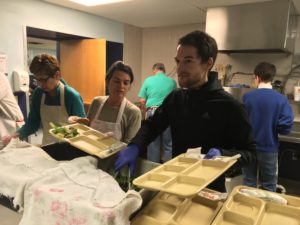 The few metaphors show that there are a lot of things you have to deal with when you’re “on the road” – even if you don’t own a physical car. Besides all the aspects I’ve named I’ve learned one very important lesson during my journey, which I want to emphasize at this point. Of course it’s important to look back and to plan next steps, but keep your main focus on the current street you’re driving through and the environment you’re passing right now. And also pay attention to the people who are driving with you just in this moment. Be aware about the current time, because the past is gone and the future is unwritten. A deep focus on the street you pass right now helps you to enjoy your ride more, it keeps you awake and prevents you from accidents.
The few metaphors show that there are a lot of things you have to deal with when you’re “on the road” – even if you don’t own a physical car. Besides all the aspects I’ve named I’ve learned one very important lesson during my journey, which I want to emphasize at this point. Of course it’s important to look back and to plan next steps, but keep your main focus on the current street you’re driving through and the environment you’re passing right now. And also pay attention to the people who are driving with you just in this moment. Be aware about the current time, because the past is gone and the future is unwritten. A deep focus on the street you pass right now helps you to enjoy your ride more, it keeps you awake and prevents you from accidents.
This consciousness let me “drive” through Kansas City without having a car. All the love, friendship, beauty, hospitality, open doors and smiling faces I’ve already passed on this journey make me grateful and happy!
You can learn more about serving as a Precious Blood Volunteer by going to www.preciousbloodvolunteers.org
You can learn more about our placement at the Bishop Sullivan Center by going to www.preciousbloodkc.org/bishop-sullivan-center/.
Jan 24, 2018
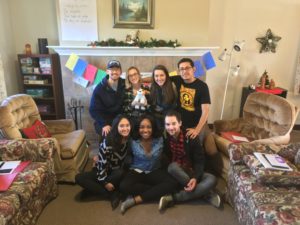
John Lee (far left, back row) pictured with his fellow 2017 Precious Blood Volunteers
During John Lee’s term of service as a Precious Blood Volunteer he spent a great deal of time organizing get togethers with the staff at Cristo Rey Kansas City High School where he served, setting up outings with the Precious Blood and Jesuit Volunteers, and initiated weekly sharing sessions with the Precious Blood Volunteer community in Kansas City. The experiences of helping connect people was something John wanted to continue after his service experience.
As he was wrapping up his term of service as a Precious Blood Volunteer at Cristo Rey in December he said he “brainstormed a bunch of ways I could pursue that goal and came across the idea of podcasting and felt that it could create that bridge!” He began writing, recording and producing a a podcast called “Starting With A Story.” “Starting With A Story” is a podcast that comes out on Monday mornings. John shares a wisdom story that covers topics from personal growth to life lessons to connecting with others. These stories are followed with John’s takeaways and specific parts of the story that resonate with him the most. The podcast finishes with a challenge to take on in order to improve and grow in your own lives based on the lessons from the story.
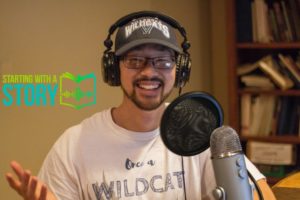
Former Precious Blood Volunteer John Lee (2017)
John will be completing his first season of “Starting with a Story” with the tenth episode. He is planning on starting work on Season 2 after a brief hiatus. His hope is to begin interviewing people about the stories they have shared with him.
You can listen to “Starting With A Story” at the podcast’s website, https://startingwithastory.com, or wherever you find your podcasts.
You can learn more about Precious Blood Volunteers at www.preciousbloodvolunteers.org.


 by
by 

 The few metaphors show that there are a lot of things you have to deal with when you’re “on the road” – even if you don’t own a physical car. Besides all the aspects I’ve named I’ve learned one very important lesson during my journey, which I want to emphasize at this point. Of course it’s important to look back and to plan next steps, but keep your main focus on the current street you’re driving through and the environment you’re passing right now. And also pay attention to the people who are driving with you just in this moment. Be aware about the current time, because the past is gone and the future is unwritten. A deep focus on the street you pass right now helps you to enjoy your ride more, it keeps you awake and prevents you from accidents.
The few metaphors show that there are a lot of things you have to deal with when you’re “on the road” – even if you don’t own a physical car. Besides all the aspects I’ve named I’ve learned one very important lesson during my journey, which I want to emphasize at this point. Of course it’s important to look back and to plan next steps, but keep your main focus on the current street you’re driving through and the environment you’re passing right now. And also pay attention to the people who are driving with you just in this moment. Be aware about the current time, because the past is gone and the future is unwritten. A deep focus on the street you pass right now helps you to enjoy your ride more, it keeps you awake and prevents you from accidents. 
